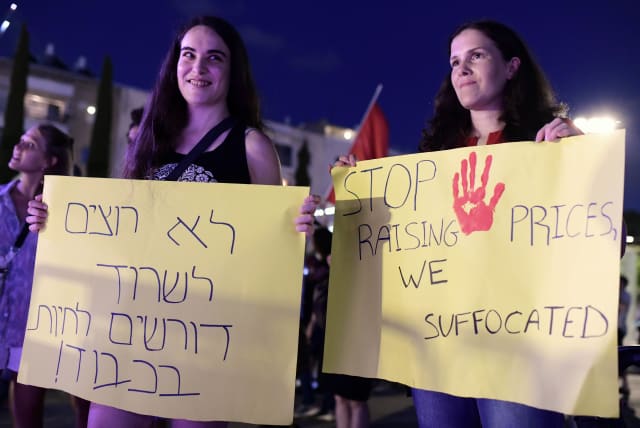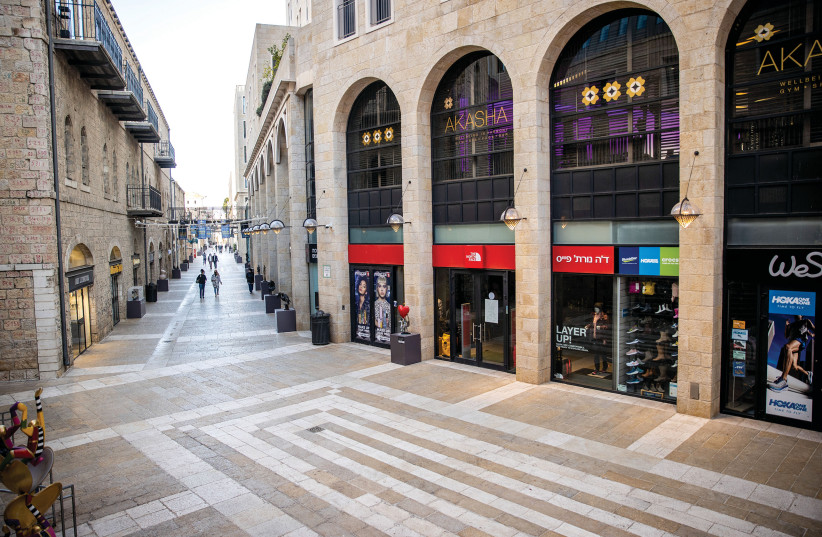Grapevine: Hanging downtown

Movers and shakers in Israeli society
WALKING ALONG King George and Hillel streets is depressing when one sees the number of shops that have been vacated. The New Year’s increase in the cost of living will probably cause more shops to close, as people have less money to spend on things they don’t really need.
There is an optical illusion that people have money because coffee shops throughout the city are well patronized, especially on Friday mornings when it is almost impossible to find a seat after 9 a.m. But feeding one’s face is often a last luxury: an opportunity to socialize and temporarily forget mounting bills and the inability to pay them all.
Nonetheless, people are also still spending on bargains. In the Mamilla Mall, locals and groups of tourists rub shoulders as they enter and exit stores that are selling clothing and fashion accessories for discounts ranging from 20% to 70%, to clear out their winter stocks before the seasonal change. It’s a good time to buy sweaters, quilted coats and jackets, which are almost timeless in their styling.
At the beginning of the week, the inclement weather did not deter shoppers who were seen in large numbers in the stores lining Alrov Avenue in the Mamilla Mall.
While several stores in town are downsizing and a few second-hand stores have gone out of business, The Boydem, which sells second-hand garments and accessories that are in almost new condition, is expanding. The store was founded as a rehabilitation occupation outlet for people recovering from mental problems and has helped them to regain their self-confidence by taking on responsibilities, such as sorting clothes that were donated or given on consignment, selling, taking care of accounts and more.
Now, according to Elie Lederman, one of the founders of The Boydem, the original city store on Herbert Samuel Street is too small, and The Boydem is moving to a new location at 1 Rivlin Street. The new location is also busier and will attract a larger clientele.
Cardiac arrest at the synaogue
■ THERE’S REALLY no way to be ready for the unexpected, but sometimes people can be lucky. Last Saturday morning in a synagogue in Neve Yaakov, a rabbi suffered cardiac arrest and, without warning, slumped to the floor at the conclusion of the reading of the Torah.
Fortunately, one of the congregants, Daniel Katzenstein, a former community rabbi and a volunteer EMT with United Hatzalah (UH), rushed over to help. Seeing that the rabbi was still breathing, Katzenstein used his emergency communication device that he carries with him 24/7 and called the UH Dispatch Center with a request for additional volunteers and an ambulance. One of the congregants brought the medical emergency kit that is kept on the synagogue’s premises, while additional UH volunteers arrived, among them Yoni Rosenfield, a voluntary paramedic.
They administered oxygen to the rabbi. A few minutes later, a mobile intensive care ambulance arrived, and the rabbi was transferred to the ambulance for further treatment. Inside the ambulance, the rabbi’s pulse temporarily disappeared but was revived by chest compressions. The volunteers managed to stabilize his condition, intubate him and sedate him.
Katzenstein stayed on board as the rabbi was taken to a hospital, where Katzenstein met another UH volunteer who invited him to lunch. Afterward, Katzenstein returned to the hospital to check on the rabbi. There was no improvement in the interim, although there has been since, and the chances are high that the rabbi will make a full recovery.
Americans and Canadians explore Tel Aviv
■ EXPLORING TEL AVIV on one’s own can be interesting but is not much fun. Realizing this, the Association of Americans and Canadians in Israel (AACI) has put together a four-day package, with the choice of joining the group on February 6-9 or 13-16. The two trips, which are identical, are part of AACI’s celebration of Israel’s 75th anniversary of independence and will include a walk on the Independence Trail, exploring unique neighborhoods, cultural sites and performance venues.
Billed as an AACI Study Trip, the tour offers lots of variety, including The Israeli Innovation Center, an art tour of southern Tel Aviv, a visit to the Milk & Honey Whiskey Distillery and a fashion tour. Participants will gain an understanding of a social action project known as Pesia’s Kitchen, in which mostly fresh fruit and vegetables are rescued and turned into nutritious meals to feed hungry children, the elderly and Holocaust survivors.
The trip will include a tour of the Aden Heritage Museum, a meeting with actors and actresses from the Habima Theater and a performance at the Suzanne Dellal Theater and/or The Na Laga’at Center, where the staff is blind and/or deaf and serve meals in the dark and also perform. It will visit the Israel Heritage Intelligence Center, tour the ANU Museum, which covers a broad spectrum of Jewish history in different countries, and visit the Steinhardt Museum of Natural History.
The trip includes a walking tour of picturesque Neve Tzedek and a visit to the Tel Aviv Museum of Art. Depending on the weather, the itinerary may be subject to change.
Accommodation for three nights will be at Herod’s Tel Aviv beachside hotel on a half-pension basis: breakfast and dinner. Kashrut and health regulations will also be observed for meals outside the hotel.
The cost is NIS 2,900 per person in a shared double room or NIS 3,950 for a single room for AACI members. Non-members will be required to pay NIS 200 extra for a single person and NIS 300 for a couple. The cost includes bus transportation from Jerusalem and back, as well as within Tel Aviv, plus a professional English-language tour guide for four days.
For reservations and additional information, contact Jeff Rothenberg at conted@aaci.org.il.
Laurent Levy is at it again
■ JERUSALEM-BASED French tycoon Laurent Levy, who has luxury properties in many parts of Jerusalem, is known for defying building regulations and, according to Yediot Yerushalayim, has done so again. Construction of his massive hotel and commercial enterprises project, which spans an entire block on Jaffa Road, was temporarily frozen by the relevant authorities because work had begun before the project was fully authorized. In addition, certain building violations had occurred during the construction process.
Levy was called in for a hearing, and eventually a compromise was reached. After all, when someone pays as much property tax as he does, it affects the kind of treatment he gets.
Among his properties is the former Bank Leumi building in Zion Square, which he turned into a luxury store for optics; the Music Square leading from the Italian Synagogue, which has restaurants, shops, entertainment, and a music museum; and the former Café Moment, around the corner from the official residence of the prime minister, which in March 2002 was the site of a terrorist attack that left 11 dead and 54 wounded. Levy tore down the building and its neighboring structures and built a large, multi-story apartment complex. And all that is just the tip of the iceberg.
greerfc@gmail.com
Jerusalem Post Store
`; document.getElementById("linkPremium").innerHTML = cont; var divWithLink = document.getElementById("premium-link"); if (divWithLink !== null && divWithLink !== 'undefined') { divWithLink.style.border = "solid 1px #cb0f3e"; divWithLink.style.textAlign = "center"; divWithLink.style.marginBottom = "15px"; divWithLink.style.marginTop = "15px"; divWithLink.style.width = "100%"; divWithLink.style.backgroundColor = "#122952"; divWithLink.style.color = "#ffffff"; divWithLink.style.lineHeight = "1.5"; } } (function (v, i) { });

